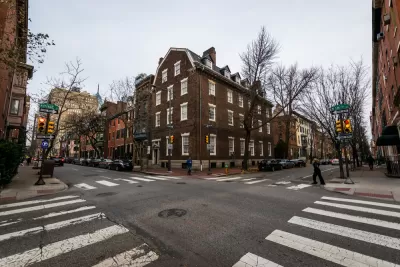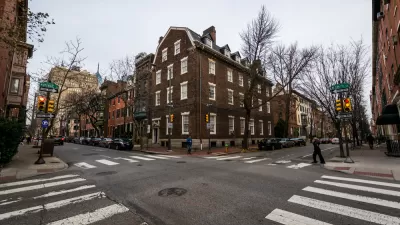Philadelphia Inquirer architecture critic Inga Saffron has had enough with the exclusionary planning tactics of the neighborhood of Society Hill to start calling it the "Republic of Society Hill."

Inga Saffron injects thick doses of snark into a conversation about the effects of exclusionary zoning and other special allowances allowed the Philadelphia neighborhood known as Society Hill:
Caution! As you head east on Pine Street through Center City toward the Independent Republic of Society Hill, be aware that you are crossing into foreign territory. There are no warning signs, no guard posts, and, so far, no barbed wire at the border. But if you pay attention, you’ll notice that street conditions change abruptly east of Eighth Street, where the neighborhood of fine, colonial-era homes officially begins.
In the Republic of Society Hill, the crosstown bike lanes have no flex posts.
According to Saffron, neighborhood advocates in Society Hill have their own opinion on the matter of using posts to protect bike lanes from vehicle traffic, and the capitulated to the neighborhood's demands when planning the project in 2018.
"This isn’t the first time that the neighborhood has decided that the laws of Philadelphia should not apply there," according to Saffron. Height bonuses allowed in the rest of the city also don't fly in Society Hill, and now the neighborhood is seeking more exceptions, thanks to the legislative work of local council representative Mark Squilla (also the author of the height bonus exception):
Over the last three weeks, Squilla has introduced two bills that would tweak the city zoning code to make it harder to build affordable apartments in Society Hill. The bills also would increase parking requirements for new construction in the neighborhood and severely limit the height of buildings on Walnut Street. A separate measure would exempt Society Hill — the city’s most historic neighborhood — from having to comply with the Kenney administration’s new incentives to encourage developers to choose preservation over demolition. (Ironically, it was Squilla who introduced the bill creating those incentives.)
According to Saffron, planners are starting to notice, and take exception, to the exceptions and exclusions granted Society Hill. Philadelphia's councilmanic prerogative means the reform will likely be difficult.
FULL STORY: When did Society Hill become a city state unto itself? | Inga Saffron

Manufactured Crisis: Losing the Nation’s Largest Source of Unsubsidized Affordable Housing
Manufactured housing communities have long been an affordable housing option for millions of people living in the U.S., but that affordability is disappearing rapidly. How did we get here?

Americans May Be Stuck — But Why?
Americans are moving a lot less than they once did, and that is a problem. While Yoni Applebaum, in his highly-publicized article Stuck, gets the reasons badly wrong, it's still important to ask: why are we moving so much less than before?

Using Old Oil and Gas Wells for Green Energy Storage
Penn State researchers have found that repurposing abandoned oil and gas wells for geothermal-assisted compressed-air energy storage can boost efficiency, reduce environmental risks, and support clean energy and job transitions.

Poorest NYC Neighborhoods Pay Price for Delivery Boom
The rise of ‘last-mile’ e-commerce warehouses — and their attendant truck traffic and air pollution — is disproportionately impacting the most historically disadvantaged parts of the city.

Greening Oakland’s School Grounds
With help from community partners like the Trust for Public Land, Oakland Unified School District is turning barren, asphalt-covered schoolyards into vibrant, green spaces that support outdoor learning, play, and student well-being.

California Governor Suspends CEQA Reviews for Utilities in Fire Areas
Utility restoration efforts in areas affected by the January wildfires in Los Angeles will be exempt from environmental regulations to speed up the rebuilding of essential infrastructure.
Urban Design for Planners 1: Software Tools
This six-course series explores essential urban design concepts using open source software and equips planners with the tools they need to participate fully in the urban design process.
Planning for Universal Design
Learn the tools for implementing Universal Design in planning regulations.
Heyer Gruel & Associates PA
City of Moreno Valley
Institute for Housing and Urban Development Studies (IHS)
City of Grandview
Harvard GSD Executive Education
Salt Lake City
NYU Wagner Graduate School of Public Service
City of Cambridge, Maryland



























